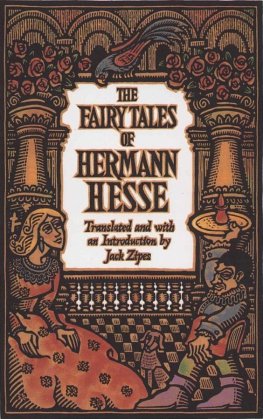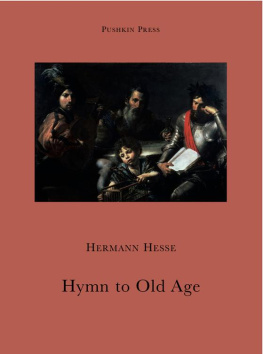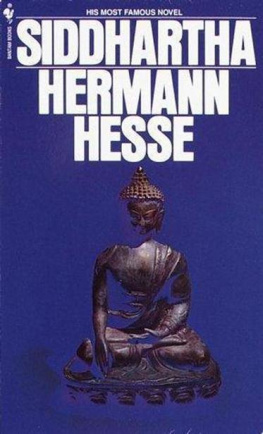Hermann Hesse - The Glass Bead Game
Here you can read online Hermann Hesse - The Glass Bead Game full text of the book (entire story) in english for free. Download pdf and epub, get meaning, cover and reviews about this ebook. publisher: Henry Holt and Company, genre: Art. Description of the work, (preface) as well as reviews are available. Best literature library LitArk.com created for fans of good reading and offers a wide selection of genres:
Romance novel
Science fiction
Adventure
Detective
Science
History
Home and family
Prose
Art
Politics
Computer
Non-fiction
Religion
Business
Children
Humor
Choose a favorite category and find really read worthwhile books. Enjoy immersion in the world of imagination, feel the emotions of the characters or learn something new for yourself, make an fascinating discovery.

- Book:The Glass Bead Game
- Author:
- Publisher:Henry Holt and Company
- Genre:
- Rating:3 / 5
- Favourites:Add to favourites
- Your mark:
- 60
- 1
- 2
- 3
- 4
- 5
The Glass Bead Game: summary, description and annotation
We offer to read an annotation, description, summary or preface (depends on what the author of the book "The Glass Bead Game" wrote himself). If you haven't found the necessary information about the book — write in the comments, we will try to find it.
The Glass Bead Game — read online for free the complete book (whole text) full work
Below is the text of the book, divided by pages. System saving the place of the last page read, allows you to conveniently read the book "The Glass Bead Game" online for free, without having to search again every time where you left off. Put a bookmark, and you can go to the page where you finished reading at any time.
Font size:
Interval:
Bookmark:
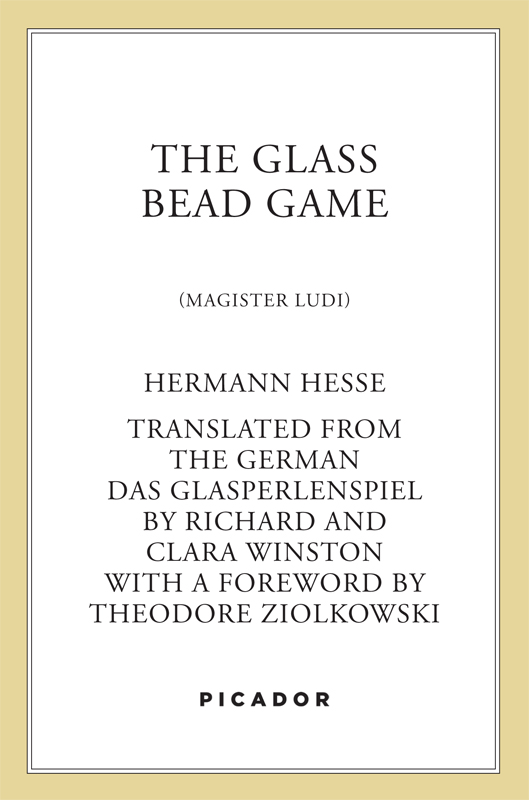

The author and publisher have provided this e-book to you for your personal use only. You may not make this e-book publicly available in any way. Copyright infringement is against the law. If you believe the copy of this e-book you are reading infringes on the authors copyright, please notify the publisher at: us.macmillanusa.com/piracy.
CONTENTS
.
.
.
.
.
.
.
.
.
.
.
.
.
.
.
dedicated to the Journeyers to the East
Foreword by Theodore Ziolkowski
The Glass Bead Game, Hermann Hesses last major work, appeared in Switzerland in 1943. When Thomas Mann, then living in California, received the two volumes of that first edition, he was dumbfounded by the conspicuous parallels between Hesses Tentative Sketch of the Life of Magister Ludi Joseph Knecht and the novel that he himself was writing, Doctor Faustus (1947). For all their differences in mood, style, and theme, both works employ a similar fiction: a pleasant though somewhat pompous narrator recounts, with a sympathy matched only by his pedantry, the life of a man whom he loves and admires. Since in each case the narrator is incapable of fully comprehending the problematic genius of his biographical subject, an ironic tension is produced between the limited perspective of the narrator and the fuller vision that he unwittingly conveys to the reader. Both authors were obsessed, in addition, with what they regarded as the self-destructive course of modern civilization, and this concern pervades both novels. But Manns view is more immediate. His narrator, Serenus Zeitblom, can see and hear the exploding bombs of World War II as he writes, and the spectacular career of the composer Adrian Leverkhn parallels with ominous precision the history of Germany from the declining Empire through the shortlived brilliance of the Weimar Republic to the raging madness of National Socialism. In Hesses novel, in contrast, that same period is described with the detachment of a narrator looking back at the Age of the Feuilleton from a vantage point in the distant future. Unlike Manns Leverkhn, Hesses Joseph Knecht succeeds in analyzing the dangers of an excessive aestheticism and acts to avert the catastrophe of intellectual irresponsibility. In both novels, finally, the authors slyly weave their experience of our culture into a pastiche of hidden quotations and characters clef.
Thomas Mann, immediately sensing that the serious theme of Hesses novel was enclosed within a cunning artistic joke, recognized the source of its humor in the parody of biography and the grave scholarly attitude. But people wont dare to laugh, he wrote Hesse. And you will be secretly annoyed at their dead-earnest respect. Hesse was pleased that his friend had put a finger on the comic aspect of the novel, but Manns prediction was correct. In the nearly half a century since its publication, The Glass Bead Game has enjoyed the adulation customarily awarded to literary classics. Indeed, largely on its merits Hesse received in 1946 the Nobel Prize for which Mann, among others, had repeatedly nominated him. Hesses opus magnum was one of the first works by a distinguished emigr to be published in Germany after the war, and it has been regularly reprinted there since 1946. The book was dutifully translated into English, Swedish, French, Spanish, Italian, and other languages. But the novel, whose title supplied us with one of those imagistically suggestive catchwords for our age, like the Waste Land or the Magic Mountain, has suffered the fate of many classicsit is less frequently read than cited, more often studied than appreciated. In Germany many readers, blandly ignoring the implicit criticism in the novel, tended to see in Hesses cultural province nothing but a welcome utopian escape from harsh postwar realities. More discerning European critics have usually been so preoccupied with the fashionably grave implications that they have neither laughed at its humor nor smiled at its ironies.
In part these one-sided readings are understandable, for the humor is often hidden in private jokes of the sort to which Hesse became increasingly partial in his later years. The games begin with the motto attributed to Albertus Secundus, which is actually fictitious. Hesse wrote the motto himself and had it translated into Latin by two former schoolmates, who are cited in Latin abbreviation as the editors: Franz Schall (noise or Clangor ) and Feinhals (slender neck or Collo fino ). The book is full of this onomastic comedy that appealed to Thomas Mann, also a master of the art. Thus Carlo Ferromonte is an italianized form of the name of the authors nephew, Karl Isenberg, who assisted Hesse with the music history that is interwoven with the history of the Glass Bead Game. The inventor of the Game, Bastian Perrot of Calw, gets his name from Heinrich Perrot, the owner of a machine shop where Hesse once worked for a year after he dropped out of school. The figure of Thomas von der Trave is a detailed and easily recognizable portrait of Thomas Mann, who was born in the town of Lbeck on the river Trave. In the person of Fritz Tegularius, Hesse has given us his interpretation of the brilliant but unbalanced character of Friedrich Nietzsche. And Tegularius spiritual opponent in the novel, Father Jacobus, borrows some of his words and most of his ideas from Nietzsches antagonist, the historian Jakob Burckhardt. The reader who fails to catch these sometimes obscure references is not only missing much of the fun of the book, he is also unaware of its implications in the realm of cultural history and criticism.
The reception of The Glass Bead Game in this country has been affected by other factors as well. The book was available after 1949 under the misleading title Magister Ludi. But if it failed to make an impact, this was due equally to the translation by Mervyn Savill, which fails to bring out its irony, and to the fluctuations of Hesses reputation in the United States. Although Hesses stature was recognized in Europe (where he was praised by such admirers as Thomas Mann, Andr Gide, and T. S. Eliot) for some thirty years before he received the Nobel Prize, Time magazine noted in 1949 that his works were still virtually unknown here. His eightieth birthday, widely celebrated abroad, passed unnoticed in the United States in 1957. And when Hesse died in 1962, a New York Times obituary stated that he was largely unapproachable for American readers. This neglect was due in part to the introspective, lyrical quality of his novels, which depart radically from the more realistic tradition that dominated American fiction between the world wars. But another circumstance was probably more important in accounting for the lack of interest in his works for a good fifteen years after he received the Nobel Prize. Hesses novels fictionalize the admonitions of an outsider urging us to question accepted values, to rebel against the system, to challenge conventional reality in the light of higher ideals. For almost two decades after World War II our society was characterized largely by the button-down-collar mentality of a silent generation whose goal it was to become a part of the establishment and to reap its benefits as rapidly as possible. Such ages have little use for critics of the system and prophets of the ideal.
But the times changed, and Hesse suddenly became relevant for a generation bent on the rejection of the consumer society of the pre-Kennedy era. But relevance resides in the mind of the perceiver, and the under-thirty generation that embraced Hesse in the sixtiesfirst as an underground classic and later as a text in high school and college courseswas better known for its rebelliousness than for its sense of irony. As a result, the Hesse cult in the United States revolved primarily around such painfully humorless works as Demian and Siddhartha, in which readers discovered an anticipation of their infatuation with Eastern mysticism, pacifism, the search for personal values, and revolt against the establishment. Those who moved on to Steppenwolf greeted it as a psychedelic orgy of sex, drugs, and jazz, but conveniently overlooked the ironic attitude through which those superficial effects are put back into perspective by the author. It was partly as a reaction against such self-indulgent interpretations, which he encountered as early as the twenties, that Hesse undertook The Glass Bead Game.
Font size:
Interval:
Bookmark:
Similar books «The Glass Bead Game»
Look at similar books to The Glass Bead Game. We have selected literature similar in name and meaning in the hope of providing readers with more options to find new, interesting, not yet read works.
Discussion, reviews of the book The Glass Bead Game and just readers' own opinions. Leave your comments, write what you think about the work, its meaning or the main characters. Specify what exactly you liked and what you didn't like, and why you think so.

